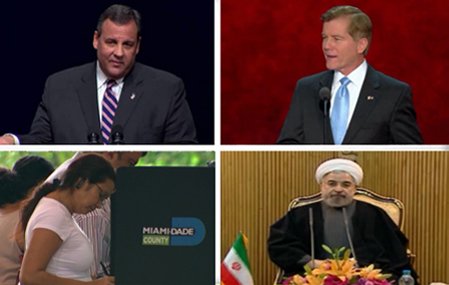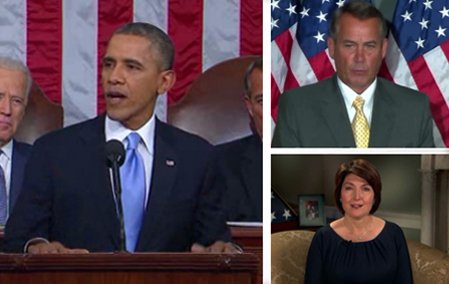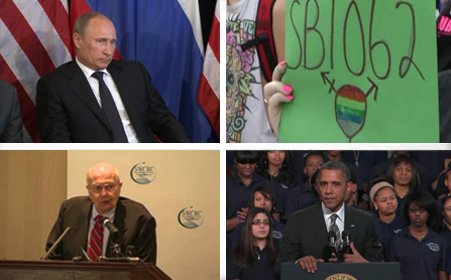Ukraine's interim Prime Minister visits the White House and Crimea referendum, CIA accused of spying on Senate intelligence committee, and the Republican party wins Florida congressional seat in special election. Joining Amy Walter of Cook Political Report: Susan Davis, USA Today; Ed O'Keefe, Washington Post; Indira Lakshmanan, Bloomberg News.
Full Episode: Russia-Ukraine Standoff, Feinstein vs CIA and Florida's Special Election Review
Jul. 07, 2014 AT 4:06 p.m. EDT
TRANSCRIPT
Notice: Transcripts are machine and human generated and lightly edited for accuracy. They may contain errors.
AMY WALTER: Eleventh-hour diplomacy stalls as the crisis in Ukraine intensifies, while at home the CIA’s accused of spying on the U.S. Senate. I’m Amy Walter, in for Gwen Ifill, tonight on “Washington Week.”
Cold War tensions escalate as Russia expands its military presence along the Ukrainian border.
SECRETARY JOHN KERRY: (From clip.) The president has made it clear there will be consequences if Russia does not find a way to change course. And we don’t say that as a threat; we say that as a direct consequence of the choices that Russia may or may not choose to make here.
FOREIGN MINISTER SERGEY LAVROV: (Through interpreter.) (From clip.) Our President Putin has already said that we will respect the choice of the Crimean peoples.
MS. WALTER: Can Moscow be persuaded to stand down, or is Crimea destined to be annexed to Russia?
The CIA gets called out for allegedly spying on the Senate committee investigating its practices.
SENATOR DIANNE FEINSTEIN: (From clip.) The CIA did not ask the committee or its staff if the committee had access to the internal review or how we obtained it. Instead, the CIA just went and searched the committee’s computers.
DIRECTOR JOHN BRENNAN: (From clip.) When the facts come out on this, I think a lot of people who are claiming that there has been this tremendous sort of spying and monitoring and hacking will be proved wrong.
MS. WALTER: We’ll have the latest on the investigation, plus why a special election in Florida may become a case study for Republicans and Democrats heading into the 2014 midterms.
Covering the week, Indira Lakshmanan of Bloomberg News, Ed O’Keefe of The Washington Post, and Susan Davis of USA Today.
ANNOUNCER: Award-winning reporting and analysis covering history as it happens. Live from our nation’s capital, this is “Washington Week” with Gwen Ifill. Once again, live from Washington, sitting in for Gwen Ifill this week, Amy Walter of The Cook Political Report.
MS. WALTER: Good evening. Despite six hours of negotiations, the U.S. and Russia were not able to reach consensus today on the best path forward to end the crisis in Ukraine. That means a referendum vote on whether the Crimea region will join Russia will happen on Sunday as planned.
Here’s how Secretary of State John Kerry summed up his marathon meetings with Russia’s foreign minister.
SECRETARY JOHN KERRY: (From clip.) We believe the referendum is contrary to the constitution of Ukraine, is contrary to international law, is in violation of that law, and we believe it is illegitimate and, as the president put it, illegal under the Ukrainian constitution. Neither we nor the international community will recognize the results of this referendum.
MS. WALTER: So Indira, there are now 80,000 Russian troops on the border of Ukraine. What is Putin’s end game here?
INDIRA LAKSHMANAN: Well, clearly, despite six hours of talks with his Russian counterpart, we are still on a collision course with Russia over this. And, you know, keep in mind this is the biggest dispute between Russia and the West since the end of the Cold War. It’s the first real invasion of another country in Europe, if you want to characterize it in that way, since the 1940s. So it’s serious, and the U.S. and Europe are taking it very seriously. The problem is, no one seems to be getting through to Putin. Even though clearly, Angela Merkel of Germany and John Kerry of the United States have tried to put out there a message about the damaging economic sanctions and diplomatic isolation and penalties that could face Vladimir Putin, none of that seems to have gotten through.
We had Sergey Lavrov, the Russian foreign minister, today saying in his own press conference in London after his long talks with John Kerry that they have no common vision. And he also went so far as to say, you know, John Kerry didn’t threaten me; there were no threats. So, you know, he was very much sort of in command, while Kerry, at his separate press conference, was saying, we know Russia has legitimate interests, we don’t want a misunderstanding here, we don’t want them to think that we don’t see their interests in Crimea, but we think this is not the way to go, that there’s a more peaceful way to do this and they shouldn’t be just annexing part of another country.
MS. WALTER: Well, that’s the question here, because there’s going to be a vote on Sunday, which Putin has said, I’m going to wait to make any decisions till after this vote. Everyone expects that this referendum is going to pass which says Crimea is going to be a part of Russia. But what actually physically happens next? They take this vote, and then does Putin bring in troops? Do they start raising the Russian flag? What goes on?
MS. LAKSHMANAN: It’s an excellent question, and I think even in Crimea itself, people don’t know. There are those in the Crimean Parliament who have said, as soon as the vote goes, we’re going to be joining Russia as soon as next week. There are others who have said that our re-entry into Russia would take up to a year. So it’s not very clear.
At the same time, you have Russia’s neighbors, NATO members such as Estonia, watching very carefully, putting out messages today that they are concerned about Russia invading the rest of Eastern Ukraine. Lavrov very angrily said, we have no plans to invade eastern Ukraine. Lavrov very angrily said: We have no plans to invade eastern Ukraine. But let’s not forget: This is the same Russian foreign minister who also said: We have no plans to annex Crimea, and that seems to be happening. So, you know, the U.S. really doesn’t want Crimea to be annexed. And John Kerry has talked about this as being essentially a shadow annexation campaign, but at this point it’s not really clear what the U.S. can do about it. This vote is going to go forward, and Kerry himself has acknowledged that everyone is expecting the vote to go in favor of rejoining Russia.
MR. O’KEEFE: So while they sort out what to do in Crimea, whoever flag’s goes up, what does the rest of the world do come Monday morning?
MS. LAKSHMANAN: Yeah, it’s a great question. Even before the vote happens on Sunday, we have the U.N. Security Council is going to vote tomorrow on a resolution. So something – you know, the world will send a message on that. Then we have on Monday, after the vote happens, Vice President Biden will be traveling to Poland and Lithuania to meet with the neighboring countries who are all allies of the United States to work out some sort of a plan. And John Kerry has repeatedly said that come Monday, the day after the vote, that consequences are coming. So I think we should all fully expect that sanctions are in the cards, that the U.S. will go ahead and probably follow the same kinds of asset freezes and sanctions that the European Union and Canada have already done.
MS. DAVIS: What do those sanctions look like, and what has Putin said about sanctions? I mean, this is – the sanctions have been talked about for weeks – (inaudible) – them. Does he care? Is he going to blink?
MS. LAKSHMANAN: Right. That’s also a great question because the Russians have essentially pot out the message that you sanction us, you’re going to pay the price. We’re going to seize American businesses’’ assets in Russia. And remember, there are a lot of major multinational American corporations who do business in Russia, and they’re concerned about that.
At the same time, in terms of how far the sanctions could go, the executive order that the president issued last week is really sweeping in its scope. And he could exercise emergency powers to essentially do everything: cut off Russian banks from the financial system, cut them off from credit card networks. He could go really, really far. All of that would amount to economic warfare, and I don’t think that at this point that President Obama wants to do that. I think they would do it in a very sort of measured way, step up sanctions. You know, first they sort of fired a warning shot over the bow last week to try to get Russia to back down. It hasn’t backed down. So I think you can expect a first set of sanctions against some Ukrainians, maybe against some Russians, individuals, and then it would step up from there, potentially. It could get very serious.
MS. WALTER: Right. And the Russian economy isn’t exactly doing great right now. Their stock market has taken a big dive.
MS. LAKSHMANAN: That’s right. And the ruble.
MS. WALTER: The ruble, right. So this will be important for them as well as for interests here.
MS. LAKSHMANAN: And it could really hurt emerging markets, and this is at a time when Russia has just joined the WTO and is getting its economy integrated into the rest of the world. So that’s a big concern. It’s a – ultimately, it could be Putin paying the price if he takes this all the way.
MS. WALTER: So we will wait to see whether or not he goes in shirt off on the horse. (Laughter.)
MS. LAKSHMANAN: Horseback.
MS. WALTER: On horseback.
Well, let’s turn back to home here. On Capitol Hill this week, a war of words broke out on the Senate floor after Senator Dianne Feinstein accused the CIA of spying on the Senate Intelligence Committee. Here’s just some of what the chairman of the committee had to say during her nearly 50-minute speech.
(Clip plays.)
SENATOR DIANNE FEINSTEIN (D-CA): Let me say up front that I come to the Senate floor reluctantly. Since January 15th, 2014, when I was informed of the CIA’s search of this committee’s network, I’ve been trying to resolve this dispute in a discreet and respectful way.
(Clip ends.)
MS. WALTER: CIA Chief John Brennan rejected the statement, saying there could be, quote, “nothing further from the truth.” Now the Justice Department is investigating the evaluations.
All right, so, Ed, until this week, you know, Senator Feinstein had been a very strong ally of the Intelligence Community. This seemed like a stepping out of sorts for her.
MR. O’KEEFE: It is.
MS. WALTER: So what is the story here?
MR. O’KEEFE: Well, we have to go all the way back to the Bush administration and after the 9/11 attacks and remember that the Bush administration implemented enhanced interrogation techniques of terrorism suspects. Then-Senator Obama was a big critic of this. As president, he immediately ended the program. And around the same time, the Senate Intelligence Committee launched an investigation to review what the CIA had done. Eventually Republicans on the committee backed out because they realized that CIA operatives weren’t going to be available, essentially, for interviews, and so they thought this would be a somewhat flawed report. But Democrats, led by Feinstein, plowed on. They worked out on arrangement with the CIA, where they could visit a facility here in Northern Virginia, go into the basement of that building, use a bunch of computers provided by the CIA and peruse 6 million documents about this situation. There was no index. There was no table of contents. They had to go through it themselves and figure out what was there.
At some point in the course of this investigation, whether they got it willingly, by mistake or from a whistleblower, the committee got its hands on some of the most sensitive documents regarding the interrogation program. That prompted the CIA at at least two points to go into those computers and try to remove some sensitive files and figure out how it is that the committee got those documents. That is what set off Senator Feinstein this week. She said if the CIA did indeed do this, they’ve not only violated the constitutional principle of separation of powers, they have violated a federal law that prohibits, essentially, snooping on computers, they’ve violated an executive order that doesn’t allow the CIA to do this, and they’ve now upset their biggest champion, at least in the Senate, Dianne Feinstein. That’s where we are.
MS. WALTER: Yeah. Isn’t her job, though – isn’t it the job of the Senate to be the overseers?
MR. O’KEEFE: Yes.
MS. WALTER: How could the CIA say you can’t access these files, these are secret? Isn’t everything open to the overseers?
MR. O’KEEFE: Well, that’s the argument that Feinstein and her colleagues have been making. And all of this is leading up to what we expect will be eventually the release of a 6,000-page report that they’ve been working on since 2009. It’s cost taxpayers $50 million to put this thing together. Feinstein obviously eager to do it, and release of it may be coming at some point soon. The CIA has received a draft copy of it. It had some very serious concerns with it, has sent those back. And in – and after they saw what the committee had, we believe it said at one point that they did some of this snooping. So the problem is, she now has to bring most of her colleagues on the committee who are Republican up to speed on what happened here. Obviously, you talk to lawmakers this week, any of them, all of them concerned that the executive branch would be withholding information from the legislation branch. That’s a big no-no. But because not everyone is aware of the details, they can’t say much yet. And as you pointed out, the Justice Department is now looking into all of this.
MS. DAVIS: Senator Feinstein’s counterpart in the committee, Saxby Chambliss of Georgia, came to the floor and maybe put the brakes a little bit on what Feinstein said and said we don’t know all the facts, let’s not jump to conclusions, and suggested that the Senate may need an investigative – an independent investigator to look into this. Is that inevitable? Do we think that this is going have to be looked into by an independent body?
MR. O’KEEFE: Yeah, I think part of it is he’s – within the committee itself, they’re all discussing this right now. That’s our understanding, at least. At some point other senators who aren’t on the committee, who are never privy to this information, might say, we have to now have a full airing of this because if that constitutional principle was violated, that is a more serious concern. So in addition to a Justice Department investigation, yes, at some point there very well may be some other kind of investigation.
MS. LAKSHMANAN: And ultimately, what is the CIA worried about? I mean, you know – (laughter) – how far could this go? Let’s say – these are documents that they had. You know, it also seems like the Oversight Committee should have had access to all of them. What do they think is going to happen once this report comes out about waterboarding?
MR. O’KEEFE: Well, if you’re a fan of the TV show “Homeland” – (laughter) – you’ll be forgiven for thinking that this is playing out now in real life. But really, what it is, they’re worried about their reputation. I mean, we know that this interrogation program was a black spot, if you will, in American history, and certainly for the CIA. You know, whether you agree with it or not, it is controversial, and it has caused a lot of angst on Capitol Hill. So, you know, they are worried about all of that getting out there. They’re also worried that some of those documents may have revealed actual sources of the CIA working overseas, and so there’s concern that it could potentially violate some of their programs. That’s, we believe, part of the reason why the agency came in, to make sure that they weren’t getting that information.
MS. LASKHMANAN: Could Gitmo get shut down as a result of this report?
MR. O’KEEFE: You know, you think ahead to all the different things that could happen. I think, you know, first and foremost, somebody may be held responsible. John Brennan, who’s lost a lot of confidence in his first year on the job, may be on the chopping block if President Obama feels that that’s necessary. But yeah, conceivably, it could one day go all the way to actually closing the place where all of these detainees were held.
MS. WALTER: And the White House seems to be sort of sitting on the sidelines right now. Do you expect that they’re going to have to engage soon?
MR. O’KEEFE: Well, he engaged a little bit this week, the president did, because he said that he supports releasing the 6,000-page report. But remember that John Brennan worked alongside him in the White House. He’s an agency veteran and how has been sent back. And the president’s pretty close to him. He didn’t suggest anything to say that the confidence has been shaken, but he did signal he’s willing to see that report released. We expect a vote on that as early as the end of the month. You’ve got seven Democrats on the committee –
MS. WALTER: A vote to –
MR. O’KEEFE: To declassify the report. You’ve got a vote on it in the committee. There are seven Democrats, seven Republicans and one independent, Angus King of Maine. He has signaled that he may be in support of doing this. Another swing vote to watch would be Susan Collins, who has – who told me this week, at least, she’s still looking at it, but she didn’t rule out possibly voting to put it out there.
MS. WALTER: All right. Well, we’re going to turn to politics now, where Republicans scored a key victory in a hard-fought congressional race this week in Florida. It’s getting a lot of national attention. The Republican, David Jolly, a former lobbyist, won a district that President Obama carried in 2008 and 2012. Democrats insist low voter turnout was the key factor in the defeat. Republicans say the results are a referendum on the Affordable Care Act. Take a listen.
(Clip plays.)
SPEAKER JOHN BOEHNER (R-OH): I would attribute the win to the fact that that our candidate was focused on the issues that were most important to the people in Florida 13. And that’s the economy and jobs, because the American people are still asking the question where are the jobs.
(Clip ends.)
(Clip plays.)
REPRESENTATIVE STEVE ISRAEL (D-NY): We’re not going to be obsessed with this election because as even the Republicans said, it does not define the environment. And even David Jolly said that. This district will be in play in November.
(Clip ends.)
MS. WALTER: So Sue, you were down in Florida in this district a few weeks ago. Is this race a bellwether?
MS. DAVIS: I’m always hesitant to use the term “bellwether” in a special election. But we have learned some very important lessons from this race. This race served almost as sort of a campaign test lab for 2014. It was a really interesting mix of a swing district, been held by a Republican congressman, carried twice by a Democratic president, almost split evenly among Democrats, Republicans and independents, and a disproportionate amount of older white voters, who also tend to vote in higher proportions in midterm election years. So in that sense, it was a perfect storm for both parties to test their campaign messages, to see what worked, to try their get-out-the-vote operations. And in the end, we saw that Republicans came out on top.
What was – a couple of things that were very interesting about this. Now, it’s been seen as a referendum on “Obamacare.” I think there is certainly more dynamics to this race, but I don’t – do not think you can deny that Republicans ran on a collective message that “Obamacare” is not working. It was not necessarily repeal, although the Republican candidate supports repeal, but that it was a message of dysfunctional government not working and being a check on Barack Obama. And that, I think, is going to be a very compelling message that we’re going to hear from Republicans.
The thing that Democrats need to be concerned about in this race is that while their message on “Obamacare” does appeal to a lot of swing voters – they like the let’s fix it, let’s keep the good parts; they like that insurance coverage has been expanded – their base is just lethargic. The people that they need to show up, young people, minorities, women, the people that are the coalition of the Barack Obama presidency, did not show up on Tuesday. And if these people do not show up in November, not only do Democrats already face almost no odds of taking back the House, but suddenly I think it makes a Republican takeover in the Senate seem much more possible after Tuesday’s election than it did before.
MS. WALTER: Yeah, and let’s talk about that because the Senate races – if you look at where control is going to be determined, they’re in districts and – I’m sorry, they’re in states that are a lot more Republican than this district in Florida. So how do Democrats hold on?
MS. DAVIS: Yes, and – well, I think what you’re going to see – and you see it a little bit already – of just trying to rile up the base. Senate Majority Leader Harry Reid recently has taken on a very strong tack against the Koch brothers and outside money. And that is a message that I think you think, well, what do regular swing voters who are living their lives, don’t necessarily care about campaign finance stuff – but this is the kind of thing that rallies up the donor base, that rallies up Democratic base voters. And they are really just stoking the fires. I think we’re going to see Democrats – the debate over income inequality, the minimum wage, sort of these wedge issues that we’re going to hear more and more about because they need something to put fire under their voters to get them engaged and interested in the election.
The other thing that was very interesting for Republicans in this race – we’ve talked so much about the data gap, that Barack Obama in the ’08 campaign and what he was able to do. Do not underestimate that Republicans have really been able to close that gap. And I talked to Republicans that said this race, to them, was a test case for not only their get-out-the-vote operation, but their voter identification. And they are very pleased with what they saw. Alex Sink, in early balloting – and this is a little wonky, but it matters – she led by thousands of votes. And early balloting tends to benefit Republicans. So she started this race, the beginning of the night looked like she was going to maybe win this. Republicans turned out their voters. They got out on Election Day, and they voted. And that is what Steve Israel needs to be worried about. Now, you can talk about “Obamacare,” not “Obamacare,” what you want it to be. But the people that are showing up – what it looks like as of Tuesday are people that are not going to want to vote for Democrats.
MR. O’KEEFE: You mentioned the Koch brothers, who run one of these large super PACs that’s spending millions of dollars, mostly against Democratic incumbents this year – a lot of money dumped into this Tampa-area district, in part because they hadn’t seen a competitive race, I think, since, what, the ’60s or so. But most of it was spent on the Democratic side. So what does this tell us sort of about their influence in these types of races?
MS. DAVIS: Well, what’s interesting is you do see – the outside coming in is leveling the playing field. Alex Sink had a very strong financial advantage as a candidate. She outraised him almost 3 to 1. She had a better organization. Outside money came in – they were split almost evenly, about $6 million, $12 million total on this race, $6 million each candidate. I think it’s just more of a continuation of seeing that outside money an unbelievable factor in these elections and that candidates aren’t controlling their message and that if you don’t have an ability – and you – we see the rise of Democratic groups because they realize if they don’t respond to this outside money that Republicans started in 2010, then – you know, it’s – so the playing field, in a way, has almost been leveled, but the influence of the outside money on both sides – it’s – you just cannot underestimate the magnitude of it.
MS. LAKSHMANAN: So is there any sign that the Democrats are actually doing something to get out their base? You talked about the young people, some of the minorities who are not as likely to go out for midterm elections. Or can we just say today, can we declare it at this table, that it’s hopeless for Democrats in the House? (Laughter.)
MS. DAVIS: Well, and this is the thing. You never know, because six months ago we were in the middle of a government shutdown, and if you looked at polling numbers then, you would have thought that Democrats were in a great position. Obviously, the “Obamacare” rollout has not played to their favor, but six months from now, could we be having a different conversation? I think it’s possible. Elections are very fluid in this environment. But I think – the health care message, I think, is one of the most – has one of the strongest staying powers, and I think that Democrats are reeling a little bit right now. They don’t have a unified message. They’re running in really difficult territory. And Republicans, in contrast, have a very unified message.
MS. WALTER: All right. Well, thank you. Thank you, everyone around this table. We have to leave you a few minutes early tonight to give you the chance to support your local PBS station, which in turn supports us. But our conversation continues online on the “Washington Week” webcast extra. We’ll talk more Ukraine, more politics, and tell you about former Massachusetts Senator Scott Brown’s big announcement in New Hampshire today. That streams live at 8:30 Eastern time and all weekend long at pbs.org/washingtonweek. Gwen Ifill will be back next week. From all of us here, good night. -
FROM THIS EPISODE


Full Episode: NSA Reforms, Benghazi Probe, ACA Political Fallout


Full Episode: Christie Saga Continues, McDonnell's Downfall, Election Reform and Syria Peace Conference


Full Episode: 2014 State of the Union, Obama's Action Agenda and GOP Response


Full Episode: Healthcare & Jobs, Economic Jitters and 2014 Election Strategies


Full Episode: Obama's Clean Debt Ceiling Bill, Obamacare Delays & GOP 2014 Strategy


Full Episode: Ukraine Erupts, Minimum Wage, 2014 Election Spending & Races To Watch


Full Episode: Ukraine Uprising, Equal Rights for LGBT community, Dingell retirement, My Brother's Keeper


Full Episode: U.S. considers sanctioning Russia over Ukraine crisis & conservatives rally in Maryland

© 1996 - 2026 WETA. All Rights Reserved.
PBS is a 501(c)(3) not-for-profit organization
